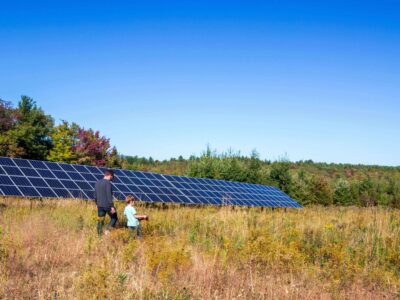May 11th, 2020
Bowdoin College, located on the grounds of a former Navy base in Maine, is modeling what a strategic investment in renewable energy could look like for higher-education establishments across America. What started with the installation of 2,147 ground-mounted solar panels and 2,329 roof-mounted panels, now provides roughly 8 percent of the college’s electricity needs. Bowdoin achieved carbon neutrality in April 2018, two years ahead of schedule, and in May 2019 the college’s sustainability efforts were recognized with a “Gold” certification by STARS (the Sustainability Tracking and Assessment & Rating System).
When the State Legislature passed a bill incentivizing large solar projects, Bowdoin was perfectly poised to participate in the new program. The new state law increases solar project allowances from 660 kilowatts to 5,000 kilowatts, giving the college some much-needed room to expand. There’s strength in numbers and Bowdoin, as part of a consortium of New England colleges, is now building 22 megawatts of a 75-megawatt solar development in Farmington, Maine. Bowdoin’s part in the solar development will generate enough RECs (renewable energy credits) to offset roughly 45 percent of the college’s electrical load, clocking in at 8,000 megawatt-hours. With construction underway, they expect the Farmington solar complex to be fully operational by the fall of 2021.
Ever ahead of the sustainability curve, Bowdoin is building the first large-scale commercial project in the state to have a superstructure of cross-laminated timber (CLT). Also known as mass timber, this new technology works with small pieces of laminated wood compressed into large panels which can stand in for higher carbon footprint materials like concrete or steel. Bowdoin received federal funds to support the construction of two new buildings, Mills Hall and the new Center for Arctic Studies, which are both set to begin this summer.

Bowdoin has big plans for the near future, partnering with other Maine schools, businesses and organizations on a slate of renewable energy projects including a substantial expansion to the college’s Navy base solar array. These efforts will replace Bowdoin’s electricity usage with 100 percent Maine-based renewable energy within two years. For Bowdoin, investing in renewable energy is a win-win. Associate Director of Sustainability Keisha Payson says: “It’s an opportunity to reduce our carbon footprint, save the College money, and further stimulate the green jobs economy in Maine.” And that seems like a smart thing to do.





